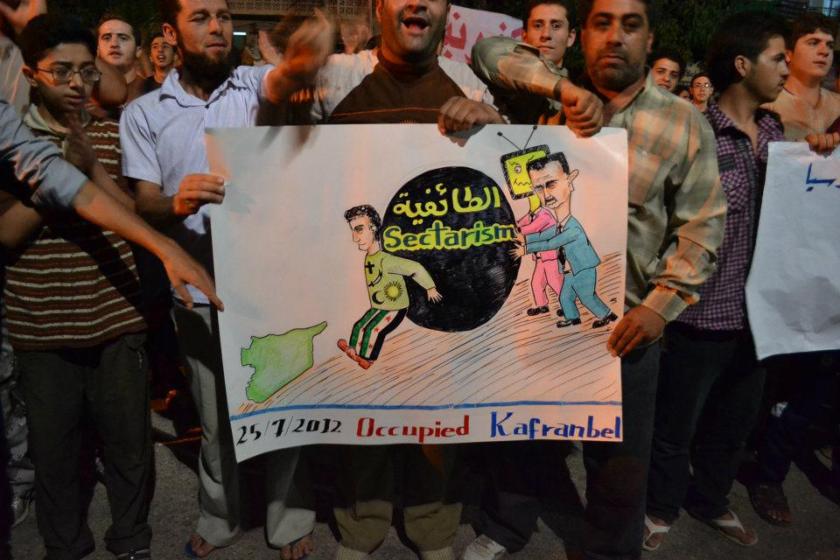This is an edited translation from Azmi Bishara’s Arabic facebook page.
1) After a legendary show of resistance in the face of an unprecedented onslaught of savagery, the Syrian revolutionaries can now almost touch their main aim: a change of regime. As I have said elsewhere, a lack of wisdom at this stage could lead to a complete destruction of the very country of Syria.
2) This progress would not have been made without the sacrifices of millions of Syrians, and tens of thousands of the armed rebels. Yet it must be said that some of the members of these armed groups used the opportunity to carry out personal vendettas, and others are clearly infiltrators into the Syrian cause. It is patently clear that foreign operatives have exploited the revolutionaries’ needs for financial and logistical support, not to mention their understandable grievances against the regime, to try and effect the course of events. In this regard, the assassinations of six Syrian scientists (including a missile expert) is a threatening development. The same can be said of the attempts of Iraqi Kurdish leader Masoud Barzani to try and control some of the Kurdish-populated areas of Syria; bear in mind that the Syrian Kurds’ National Council is now well armed, whilst not having taken part in the revolution itself. We cannot assume that the Israelis and the CIA will stand backk and just watch. (Put another way: was the removal of the former head of the Saudi Arabian intelligence service a mere coincidence?) The recent statements made by Israeli and American statesmen on the question of Syria’s chemical weapons is to be taken seriously: their efforts are already underway. Anybody who doesn’t understand this point, clearly does not understand the way in which world powers and their regional counterparts attempt to achieve their aims, and does not understand the reality of the enmity [between the Israelis and the other countries in the region], nor does that person understand the strategic significance of Syria.
3) The Syrian revolutionaries are true patriots, and this is reflected in their movement. This truth does not change another fact, however: that there is no single, unified, country-wide military chain of command for the armed wing of the Syrian revolution. Added to this is the very real danger of sectarian bloodletting along the country’s fault lines.
4) So long as the aim of the revolution is the toppling of the regime and its replacement with a state based on citizens’ rights, then the preservation of the Syrian state’s institutions is an aim of no lesser importance than the toppling of the regime: anarchy would be “the worst form of tyranny”. This necessitates an orderly hand over of power, and the resignation of Bashar Al Assad. The demand must remain the transformation of the Syrian government towards a new, democratic order; this does not mean, however, that the military and the other state institutions need to be undone. Indeed, one hopes that all of the services of the state, from the supply of food rations to transportation and even defense of the borders, should function on the very next day following Bashar Al Assad’s resignation. We cannot ignore the resilience of the certain state institutions within Syria; it is a point of fact that the Syrian regime has managed to remain in place even after some of its highest-ranking military and security personnel were liquidated. Russian and Iranian backing for the Assad cannot alone account for this resilience: without a certain societal context, and without a true institution in the shape of an army which makes the regime’s tyranny possible, Russian and Iranian support would have been futile.
5) Any transitional government which comes into place must have limited powers and responsibilities, and must include, alongside representatives of the revolution and the political opposition, members of the present regime—provided that they are not personally associated with the present levels of brutality. Such a transitional government would then pave the way for a truly democratic constitution, and the holding of elections.
6) All of the main political forces within Syria must be parties to such a process; not only the politicians, but also the intellectuals and individual politicians who command respect within the country must play a role, provided they are looking not for power but seeking to preserve the integrity of Syria. We must ensure that foreign powers do not impose their agenda for a sectarian quota on the country.
7) Dedication to Syria and its future sovereignty must govern our planning for “the day after”. This is the challenge which will determine whether or not the Syrian revolutionaries truly are ready to become statesmen. It may be true that the Al Assad regime has yet to fail, but it is not too early to start now. Being able to plan for these eventualities will guide the work in the final stages of the revolution.
